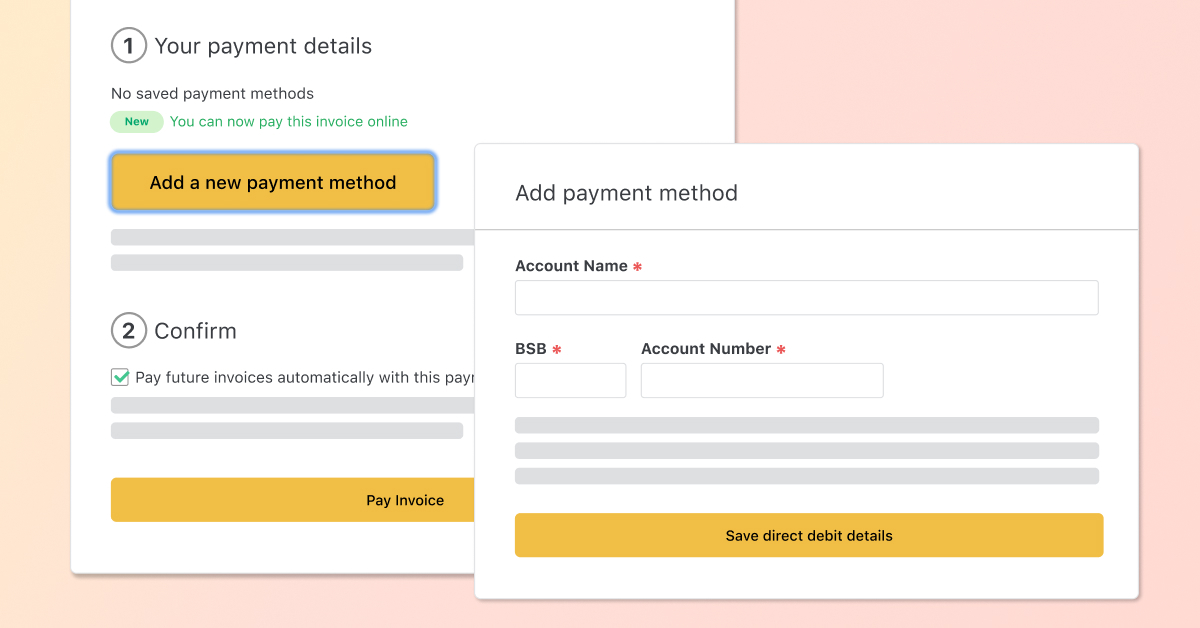Managing change with your clients – upfront payments and monthly billing

Many clients still object to providing their credit card details upfront when signing a proposal or engagement. They usually have a ‘valid’ reason. Perhaps they don’t yet have a business bank account, or maybe they haven’t got their details to hand.
However, these problems never occur when they’re signing up to a mobile phone provider or even grabbing a mid-morning coffee—they only seem to occur when it comes to dealing with professional service providers.
The importance of upfront payments
By not changing to upfront payments, you create three problems:
Missed cash until you do finally receive what you’re owed
An extra time and admin burden chasing the details
The risk of completing unpaid work
The price tag? For our practice, it was well over £100k per year: including approx £30k salary contribution from our finance team, bad debts, decreased productivity, and so on.
But by integrating the proposal, engagement, agreement, and payment processes into one smooth workflow, Ignition instantly solved these problems.
Of course, integrating Ignition is just the first step—you also need to get your clients onboard. Here’s how.
An expert’s guide to handling objections
Let’s demonstrate how you can walk your client through this process, sidestepping potential objections along the way.
You: “We’re looking to systemise, reducing bad debt and ensuring compliance with our Institute. This is what I’d be advising my own firm if it was a client here.”
The client: “Well, I always pay within your ‘xx days’ term.”
You: "I'm really thankful for that, but unfortunately not every client does, meaning that good payers like you—the companies that we love working with—are suffering the cost and burden. We’re now only working with those who commit to paying us on agreed terms, so that we can focus on your business rather than our own."
The client: "Yes, but I want to be in control of my payments.”
You explain that they will still be in control—whether it’s the DD guarantee, or the clawbacks on cards.
You: "Ultimately, if there is so much as one client who is outside this upfront payment system, we’d need to employ a credit controller at a cost of £30k. This means we will have to charge clients (like you) higher fees as a result.
The client: “Okay, well I don't want to give you my financial details.”
Just let that float awkwardly in the air for a moment before gently reminding them that you can already see their bank details every day.
The client: "Fine—but I don't have a business bank account yet.”
You: “No problem—so which account do you use to pay your business’s mobile phone or internet providers?”
If that doesn’t work, you can always try the ‘brave’ option.
You: “Are you telling me that you don't want to pay us?"
The client: "Of course not.”
You: “Look, we’re just trying to make sure that we’re paid on time. That’s all.”
If a client still grumbles and moans after hearing this, they’re probably not the right client to be working with. It’s as simple as that.

The benefits of converting to monthly billing
Once you’ve agreed to automate payments, you can then look at transitioning from an annual to a monthly billing process.
Our practice decided to make both changes at the same time and were really clear in explaining the mutual benefits:
Improved cash flow for both sides: no more ‘lumpy’ payments or receipts
Removes any perceived cost-based hurdle for the client to ask for ad hoc advice—the clock isn’t ticking
Reflects the nature of our ongoing services and that we aren’t just a once-per-year cost
Reduced administrative hassle for us, resulting in more customer focus
Remember: clients who resist change aren’t necessarily the best clients to dictate your systems and processes. If you know that ‘Client X’ is going to be upset about the change, you shouldn’t automatically think that every client will act in the same manner.
What if my clients don’t want to change?
Some people just don’t like change. They know what they like, and they like what they know. Below, I’ll share some tips on making life easier for these particular clients.
But firstly, are you sure you want to work with them?
At d&t, we work with household names—listed companies that generally require suppliers to go through a tender process. They’re the kind of businesses that you might think are ‘too big’ to do this kind of thing.
But you’d be surprised. Many accept because it makes life easier for them—just because they have a huge finance team doesn’t mean that they want to create additional work for them.
In these cases, we take extra time to work with the key stakeholders in corporate to ensure that all supplier forms are completed, that budgetary sign-off has taken place, and that the tender is for the period outlined in the contract. Once that has been completed, there’s less resistance than you may think.
Making life easier for clients
If you do decide to allow your clients to pay on invoice, for whatever reason, there is a way to help your cashflow and remove any objections from their end.
The ‘Review and Pay’ functionality allows your clients to enter their payment details at the point the invoice is generated. Not only does this remove any perceived hurdles of making payment—such as logging into their online banking and setting up a payment, or even worse, finding their cheque book—but it also allows them to opt into their payment details being saved on the system for future invoices.
I know that I personally always do this when shopping online, so your clients might well be happy to follow suit.
Don’t be afraid to make a change
Rocking the apple cart, especially when it comes to payments, can feel like a risky endeavour. However, upfront payments and monthly billing will completely transform your practice—so don’t be afraid to make a change.
Explain your reasoning, walk them through any new or uncomfortable steps, and reiterate the mutual benefits. By following this process, you’ll soon convince clients that this short-term change is ultimately for the best over the long run.
To learn more about how Ignition helps practices gain payment details upfront and transition to monthly billing, start a free trial or book a demo and speak with one of our experts

